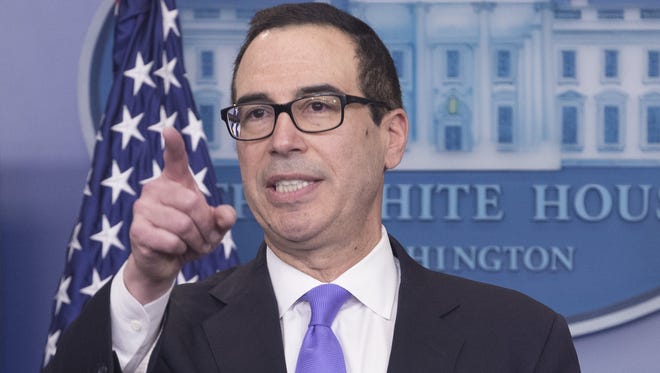Small businesses get hefty tax cut in Trump plan

President Trump’s tax reform proposal may just be an opening bid of a long negotiation he's anticipating, but it delivers an aggressive cut that small business owners have been clamoring for.
Announced Wednesday afternoon, Trump’s plan would lower corporate tax rates to 15% from the current 35%. It would also reduce the business income rates paid by the so-called pass-through businesses – including many small businesses formed as partnerships and limited liability companies and some larger entities like hedge funds – to 15%. These businesses’ incomes are “passed through” to owners, who then pay taxes based on the individual income rates, ranging from 10% to 39.6%.
Even though Trump promised to cut pass-through tax rates during his campaign – his real estate company, the Trump Organization is a pass-through -- small business owners have not let up in insisting on being treated equally in corporate tax reform and the president's proposal drew their applause.
"We’re pleased to see the 15 % business rate,” says Brad Close, senior vice president of public policy and advocacy for the National Federation of Independent Business. “We think it’s a great way to kick-start the small business economy.”
Small firms seek level playing field in tax reform
While much of the media attention has focused on large corporations, small businesses employ about half of non-public sector American workers, making their health and success vital to the U.S. economy. Since the last major tax reform in 1986, establishing businesses as pass-throughs has become increasingly popular for entrepreneurs since it typically gives them lower tax rates than paying the corporate rate.
In the press conference Wednesday, Trump’s key economic aides – Gary Cohn, director of the National Economic Council, and Treasury secretary Steven Mnuchin – said the stimulative effects of the tax cuts will spur economic growth and help make up for much of the anticipated increase in the deficit. The goal, Mnuchin said, is to generate "3% or higher" growth that is sustainable.
“I do think dramatically lowering the corporate tax rate will have a significant effect on economic activity,” says Joe Kennedy, senior fellow for economic policy at the Information Technology and Innovation Foundation. American companies, lured by lower tax rates, will be less inclined to flee the country, looking for tax havens in their investment, he said. “It will draw economic activity to the U.S. It reduces incentives to go abroad.”
Still, tax cuts for pass-through businesses alone could enlarge the deficit by hundreds of billions of dollars, and deficit hawks from both parties will continue to hammer the administration on its lack of details on how to manage the increase. “It’s a whole issue sitting out there,” says Dean Zerbe, national managing director for tax advisory firm alliantgroup . “This will be a case where you’re going to have a significant issue with tax revenue.”
Trump team rolls out 'really big' tax cut package, but Congress is wary
Calling the 15% proposal for pass-throughs “ambitious,” Zerbe says it will likely be negotiated up to a higher rate. “It’s more aspiration than realistic. But it’s good for the administration to put a strong marker. Why not be aggressive with the opening bell?” he said.
Democrats also point out that tax cuts for pass-through businesses will end up enriching wealthy individuals. “The very wealthy are doing pretty well in America," said Sen. Chuck Schumer (D-NY). "They don’t need another huge tax break.”
Gaming the system?
Another issue to be negotiated is how to prevent business owners from gaming the tax system under the new rate. If the 15% pass-through rate holds, many business owners would want more of their bottom line classified as business income that is taxed at the new low rate. They will want to classify less of their income as personal income – say, their salary -- which would likely be taxed at higher rates.
Employees also may want to ask their employers to release them from employment contracts and rehire their services through a pass-through business they create since salaries are likely taxed higher than consulting revenue.
Trump has not disclosed how he plans to eliminate this potential for abuse. Mnuchin said earlier this week that “what this is not going to be is a loophole to let rich people, who should be paying higher rates, pay 15%.”
There have been a few proposals to clearly specify ratios on how much of pass-through businesses’ incomes can be classified as business income – say, 50% or 70% classified as personal income.
Business owners want "simple clear rules to follow," Close of NFIB says, adding that a 50-50 split seems "equitable."
Kennedy of ITIF says the distinction "doesn't really get at the problem." If a consultant or an employee of a consulting firm both make $200,000 a year, they both ought to pay the same tax, he says.
"If you believe the federal deficit is a problem, then personal income tax rates on highest earners have to go up, not down," he says. "The deficit is a problem."
Follow USA TODAY reporter Roger Yu on Twitter @ByRogerYu.